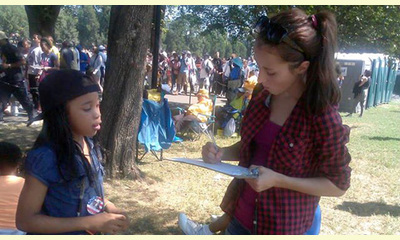|
|
The power and hope of the March on Washington
un article par Joelle Fishman, People's World (abridged)
I was a 16-year-old student at Camden High School
when I traveled from New Jersey to Washington D.C.
on August 28, 1963, to participate in the March on
Washington for Jobs and Freedom. In the days
leading up to the march, radio programs and
newspapers blared warnings of bloodshed on the
National Mall. This provocation made me even more
determined to attend. . .

Mikaila, age 9, getting page after page of signatures on a petition to support the Youth Jobs Act, during the 50th Anniversary March on Washington, Aug. 24, 2013. Lisa Bergmann/PW
click on photo to enlarge
When we arrived in Washington, the massive
outpouring of people from all over the country,
dressed in their Sunday best, so peaceful and
respectful and looking out for each other, brought
me to tears of joy. Unions handed out signs to
carry. I wrote down the name of each speaker and
performer on my souvenir program, which I treasure
to this day.
This march was a turning point in the long, hard
journey to break through Jim Crow segregation and
win passage of the Civil Rights Act and the Voting
Rights Act. It made an indelible impact on my
life. It showed me the power of collective action,
and the necessity to stand up for justice. It also
showed me that the struggle for equality is
ongoing. As I searched for the vehicle to forge
multi-racial unity, I found my home in the
Communist Party.
It was thrilling to be part of the local
organizing for the 50th Anniversary March on
Washington and to travel, this time from New
Haven, Conn., to Washington with a bus full of
young people age 7 on up looking for hope and
eager to act. Once at the march, they collected
over 200 signatures on petitions for the Youth
Jobs Act introduced by Rep. John Conyers and Sen.
Bernie Sanders. . .
"My question is," said one youth leader on the bus
ride home, "what are we going to do after the
march?" . . .
"This shows that it is not just one city, not just
one state, it is the whole country that must
organize and change," declared a neighborhood leader
and union activist in Washington for the first time.
The message of the march is for action,
organizing, voter registration and get-out-the-
vote. This is the time to demand and elect a
Congress that will address structural racism and
economic inequality and expand democratic rights
by passing a new voting rights act that expands
participation rather than blocking it; passing
immigration reform with a way to citizenship;
investing in massive job creation that rebuilds
our infrastructure and creates an economy based on
sustainability instead of war production; and
investing in public education from preschool to
college.
The courageous 1963 march inspired many young
people to continue in the struggle for equality,
peace and justice through their lives. Today, in
the face of an all-out attack on working people,
on Black and Latino youth and elected officials,
the courageous 50th Anniversary March can serve to
inspire the next generation of leaders to build
bigger and stronger unity that can carry the
struggle for equality, peace and justice to a
higher level.
[Note. Thank you to Joe Yannielli, the CPNN
reporter for this article.]
|








|
DISCUSSION
Question(s) liée(s) à cet article:
What's the message to us today from Martin Luther King, Jr.?,
* * * * *
Commentaire le plus récent:
I think Martin Luther King, Jr. would be happy that "drum majors for justice" are using the latest technologies to advance the cause of racial justice. The "just Democracy Blog" is a wonderful resource . One of the goals of the bloggers is to advance the national dialogue on racial justice. I recommend joing the Advancement Project mailing list.
justdemocracyblog

|
|









